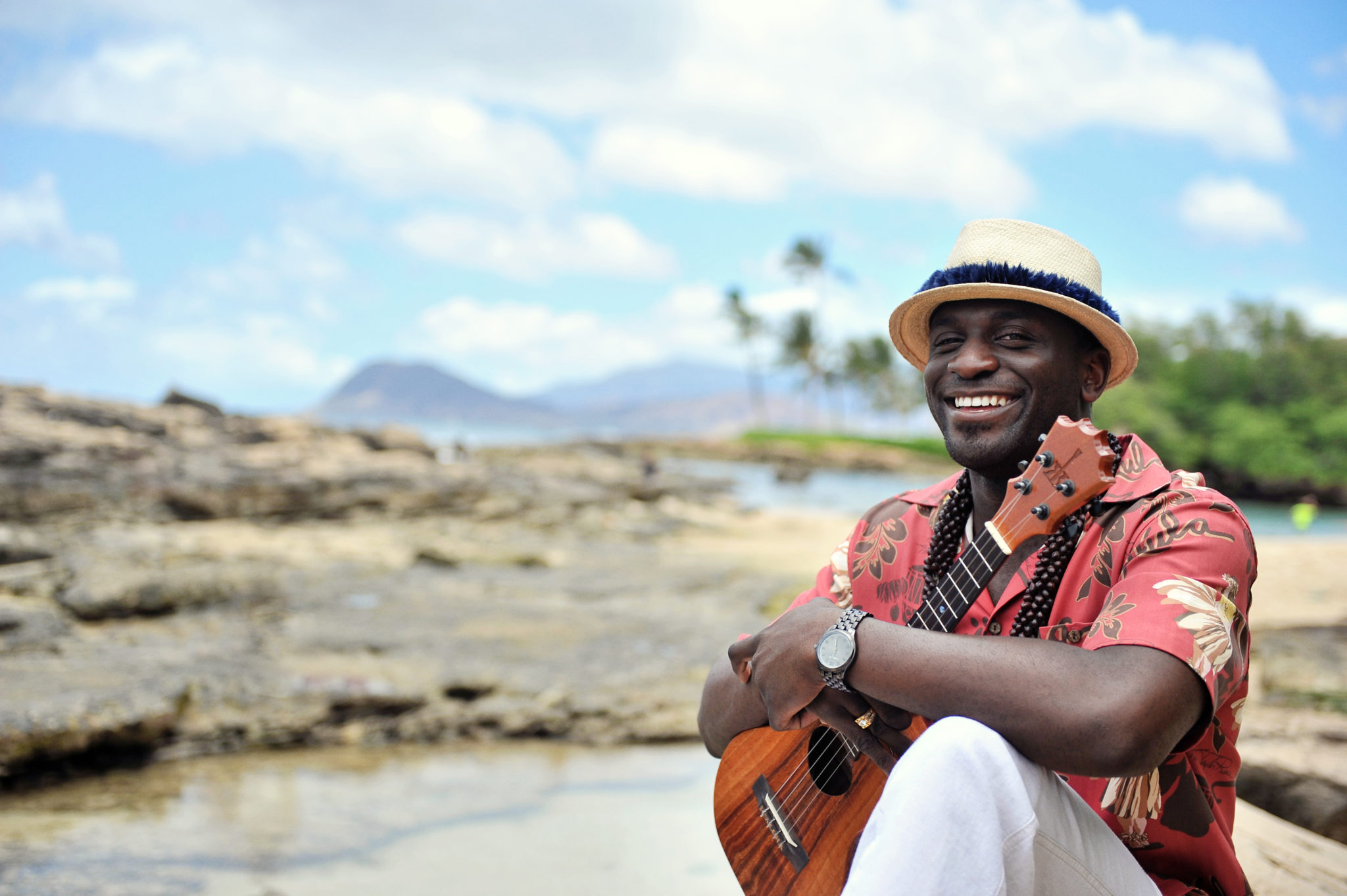Raised on Maui, the African American musician who performs traditional Hawaiian music has a voice that soars.
Despite their warm aloha, the audience at the 36th annual Nā Hōkū Hanohano Awards can be a tough crowd to impress. The aunties at the back tables are as cutting as the audience at Showtime at the Apollo and just as hilarious in their dissection of under-par performances.
But there was no eye-rolling when Ryan Kamakakehau Fernandez, who had just won “EP Release of the Year” for Wahi Mahalo, took the stage to perform a haunting Hawaiian rendition of “Bridge over Troubled Water.”
The Hokus are a celebration of a culture that nearly lost its language, from which one articulates and sings about one’s place in the world, and to win an award has evolved into a major accomplishment.
Ascending to the podium after his win, Kamakakehau, translated as “the heart’s desire,” didn’t need to reiterate part of his autobiography, but did so anyway. “I dedicate this first award to my mother, for raising me on the beautiful island of Maui,” he said to the Hawaiian entertainment community.
“I hope this is an inspiration to kamali‘i (children) that shows them that everyone deserves the right to ‘ōlelo Hawai‘i.”
Kamakakehau was born in Little Rock, Arkansas. At six weeks old, he was adopted by Robyn Nae‘ole and brought to Hawai‘i to be raised on the Valley Isle. His family enrolled him in Ke Kula Kaiapuni ‘o Kekaulike, the Hawaiian language immersion program at King Kekaulike High School, and he spent his teenage years learning to be a professional singer.
While he is an African-American, non-Native-Hawaiian young man performing traditional Hawaiian music, Kamakakehau has a talent that has always overshadowed any questions of authenticity or issues of discrimination.
Online videos of his performances have been gaining in popularity. YouTube comments, which are often vile, have only expressed aloha.
“Truly a special gift from our Hawaiian Gods-he is a special Hawaiian-with a special voice,” wrote one viewer. “Hey I like see more of this bruddah please. He sure is all Hawaiian no doubt,“ wrote another.
“Everyone wants to know where I came from, and sometimes that gets old,” Kamakakehau explains. “But I realize I have a story to tell, about ‘ohana, and I’m doing my best to tell it.”
Leo ki‘eki‘e, or Hawaiian falsetto singing, is intensely demanding to perform. Many singers in Hawai‘i don’t even try. This is due in part to the fact that local entertainment legends Gabby Pahinui, Aunty Genoa Keawe, and both of their respective families astounded audiences for decades with only a four-stringed ‘ukulele and a voice that sung sweetly and melodically in the upper-octave register.
“It takes years, decades even to make it work,” Kamakakehau says. “Usually people who sing in this style begin really young. I was late. I started in 2003 when I was already 18.”
But Kamakakehau was a natural, and in his first year singing, he won the Ho‘opi‘i Falsetto Contest at the 2003 Maui Aloha Festival.
Kamakakehau now performs professionally, teaches private ‘ukulele lessons, and has made several excursions to California and Japan to perform. In addition to singing across the Hawaiian music-loving diaspora, the singer is also ready to try different styles, which he’s been experimenting with in performances throughout Waikīkī.
“I was doing shows almost every day the last few years, and I’ve gotten to the point where I can do what I want up there performing. It’s good to be versatile. Eventually, I want to do more neo-soul and gospel, like Philadelphia artists Musiq Soulchild or Jill Scott.”
For Kamakakehau, winning a Hoku award was both a validation from an ‘ohana of elite performers and a distinction for his excellence in practicing an exceedingly difficult medium. “I was so thankful to be up there, to perform for that crowd,” he says of the event.
“In the next few years, I’d like to work more with adoption agencies, continue to teach ‘ukulele, perform, and work with others. It took a long time to get this far. My mom told me that I can’t expect to please everyone. There are so many musicians I still want to work with, and so many places I’d like to take my music. This is just the beginning.”
For more information, or to purchase Wahi Mahalo, visit kamakakehau.com.

